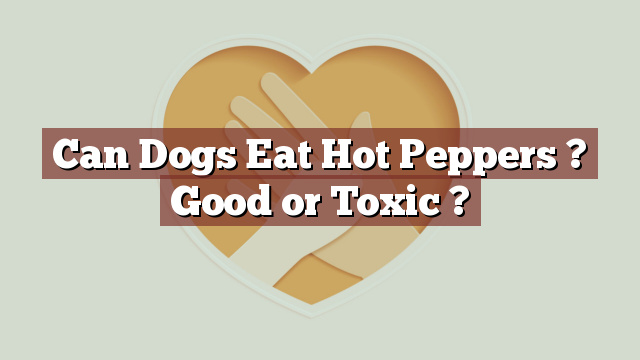Can Dogs Eat Hot Peppers? Good or Toxic?
When it comes to our furry friends, it is crucial to be aware of what foods are safe for them to consume. Dogs have different nutritional needs than humans, and certain foods that are safe for us may be harmful to them. In this article, we will explore whether dogs can eat hot peppers and determine if they are good or toxic for our canine companions.
Nutritional Value of Hot Peppers: Vitamins, Minerals, and Antioxidants
Hot peppers, such as jalapenos, habaneros, and chili peppers, are packed with various vitamins, minerals, and antioxidants. They are rich sources of vitamin C, vitamin A, potassium, and dietary fiber. Hot peppers also contain capsaicin, a compound responsible for their spiciness, which has been associated with anti-inflammatory and pain-relieving properties in humans.
Can Dogs Eat Hot Peppers? Understanding the Safety and Toxicity
Can dogs eat hot peppers? The answer is no, dogs should not consume hot peppers. While some dogs may be able to tolerate small amounts of spicy food, hot peppers can be potentially toxic to them. The high levels of capsaicin in hot peppers can cause gastrointestinal upset, including stomach pain, diarrhea, and vomiting in dogs. It can also irritate their mouth, throat, and digestive system, leading to discomfort and potential long-term damage.
Veterinarians advise against feeding hot peppers to dogs, as their digestive systems are not designed to handle the spiciness and heat present in these peppers. It is best to avoid giving hot peppers to dogs altogether.
Potential Risks or Benefits of Dogs Consuming Hot Peppers
While hot peppers may offer some health benefits to humans, such as boosting metabolism and reducing inflammation, these benefits do not apply to dogs. The potential risks for dogs consuming hot peppers outweigh any possible benefits. Dogs may experience severe discomfort, gastrointestinal distress, and even allergic reactions from consuming hot peppers. It is essential to prioritize your dog’s well-being by avoiding potentially harmful foods like hot peppers.
What to Do If Your Dog Eats Hot Peppers: Signs, Treatment, and Prevention
If your dog accidentally consumes hot peppers, it is important to monitor their behavior and look out for any signs of distress. Symptoms of pepper ingestion may include excessive drooling, panting, restlessness, vomiting, diarrhea, or signs of discomfort. If you notice any of these symptoms, it is crucial to contact your veterinarian immediately for guidance.
Treatment for pepper ingestion may include inducing vomiting, administering activated charcoal to absorb any remaining toxins, and providing supportive care to alleviate symptoms. Prevention is always better than cure, so ensure that hot peppers and other spicy foods are kept out of your dog’s reach.
Conclusion: Consult a Veterinarian Before Including Hot Peppers in Your Dog’s Diet
In conclusion, dogs should not eat hot peppers as they can be toxic to them. While hot peppers offer various nutritional benefits to humans, they do not provide the same advantages to our canine companions. It is crucial to consult with a veterinarian before including any new food in your dog’s diet to ensure their safety and well-being. Remember, it is always better to be safe than sorry when it comes to your beloved pet’s health.
Thank you for investing your time in exploring [page_title] on Can-Eat.org. Our goal is to provide readers like you with thorough and reliable information about various dietary topics. Each article, including [page_title], stems from diligent research and a passion for understanding the nuances of our food choices. We believe that knowledge is a vital step towards making informed and healthy decisions. However, while "[page_title]" sheds light on its specific topic, it's crucial to remember that everyone's body reacts differently to foods and dietary changes. What might be beneficial for one person could have different effects on another. Before you consider integrating suggestions or insights from "[page_title]" into your diet, it's always wise to consult with a nutritionist or healthcare professional. Their specialized knowledge ensures that you're making choices best suited to your individual health needs. As you navigate [page_title], be mindful of potential allergies, intolerances, or unique dietary requirements you may have. No singular article can capture the vast diversity of human health, and individualized guidance is invaluable. The content provided in [page_title] serves as a general guide. It is not, by any means, a substitute for personalized medical or nutritional advice. Your health should always be the top priority, and professional guidance is the best path forward. In your journey towards a balanced and nutritious lifestyle, we hope that [page_title] serves as a helpful stepping stone. Remember, informed decisions lead to healthier outcomes. Thank you for trusting Can-Eat.org. Continue exploring, learning, and prioritizing your health. Cheers to a well-informed and healthier future!

